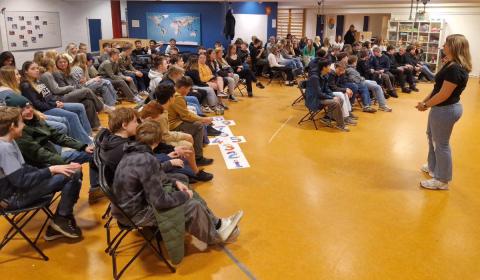
Image source: by Markus Winkler on Unsplash
In Rotterdam, but also in other Dutch cities, food supply in public spaces has increased sharply in the past 15 years and the share of (unhealthy) fast food has grown strongly. Since 2004, the fast food share in Rotterdam has grown by 46%1. This increase is greatest in neighborhoods with a low socio-economic score. While tax and VAT regulations are part of a wider national campaign for healthy food, excluding new fast food and snack restaurants in certain areas is legally more complex and requires coordinated and targeted actions by individual municipalities.
Together with Amsterdam, Utrecht, and Ede, Rotterdam has taken a leading role when pushing for more legal options and instruments in banning new fast food and snack restaurants in key urban locations and in locations where there is already an abundance of unhealthy food.
Karin de Jager, policy maker at the Municipality: “I think it was precisely the joining of forces that made this breakthrough possible. This specifically concerns the space that municipalities must be given in the law to keep out new fast food establishments (around schools and other places where many children come). A new food law is now being considered, in which other subjects can be included, such as children's marketing or the sale of food in non-food stores such as hardware stores.”
Having joined the national policy initiative ‘City Deal – Food on the Urban Agenda’ already back in 2015, Rotterdam can be considered as an early mover in the world-wide transition towards a more healthy and sustainable food system. With more than 600.000 inhabitants in the municipality and more than a million people living in the wider metropolitan region, Rotterdam is hence focusing on ‘hot spots’ such as the neighbourhood Beijerlandselaan which has been put forward as the FEAST Living Lab.
Key to the progress has been the close cooperation with the other cities, leading to aa series of academic and policy studies to underpin their quest for legal changes:
-
Municipal instruments for a healthy food environment2
-
Legal instruments for a healthy food environment in the city3
These studies provided crucial information on the health trends in Rotterdam as well as on the legal-political opportunities to make use of. Based on international, European, and national fundamental rights, such as the International Covenant on Economic, Social and Cultural Rights (ICESCR), the government has a responsibility to ensure a healthy food environment. On the basis of the Public Health Act and the Youth Act, municipalities have the responsibility to formulate measures to reduce health threats, such as overweight and obesity. However, the (inter)national laws and regulations do not make any statements about which instruments can or should be used for this.
Only by means of joining forces, administrative involvement, as well as committed aldermen, the powerful lobby of the food industry and retail, can be counterbalanced.
Legislation and regulations are the crucial final pieces in the transition puzzle of the food environment, where non-binding cooperation with food suppliers and manufacturers does not yield sufficient results.
In a community-based approach, a careful start-up phase in which support is created from residents, entrepreneurs, social organizations and professionals, in short, from key figures in the neighbourhood, is essential. This takes time. The approach is process-based: at the front end it is not yet known what the activities or revenues will be and even the goals are not fixed. These are determined jointly.
References
>> * Gemeente Rotterdam, Team Public Health, Well-Being & Participation, ** SusMetro, The Netherlands,
1 https://www.cephir.nl/rapporten/Rotterdam-voedselomgeving_Rapport_CEPHIR_WEB.pdf,
2 City Deal report prepared by policy officers health and healthy living environment of the gemeenten Amsterdam, Ede, Rotterdam and Utrecht. 56p.,
3 van Kolfschooten, H., Neerhof, R., Nijboer, A., de Ruijter, A., & Visser, M. (2020). University of Amsterdam)
FEAST Living Lab Rotterdam


